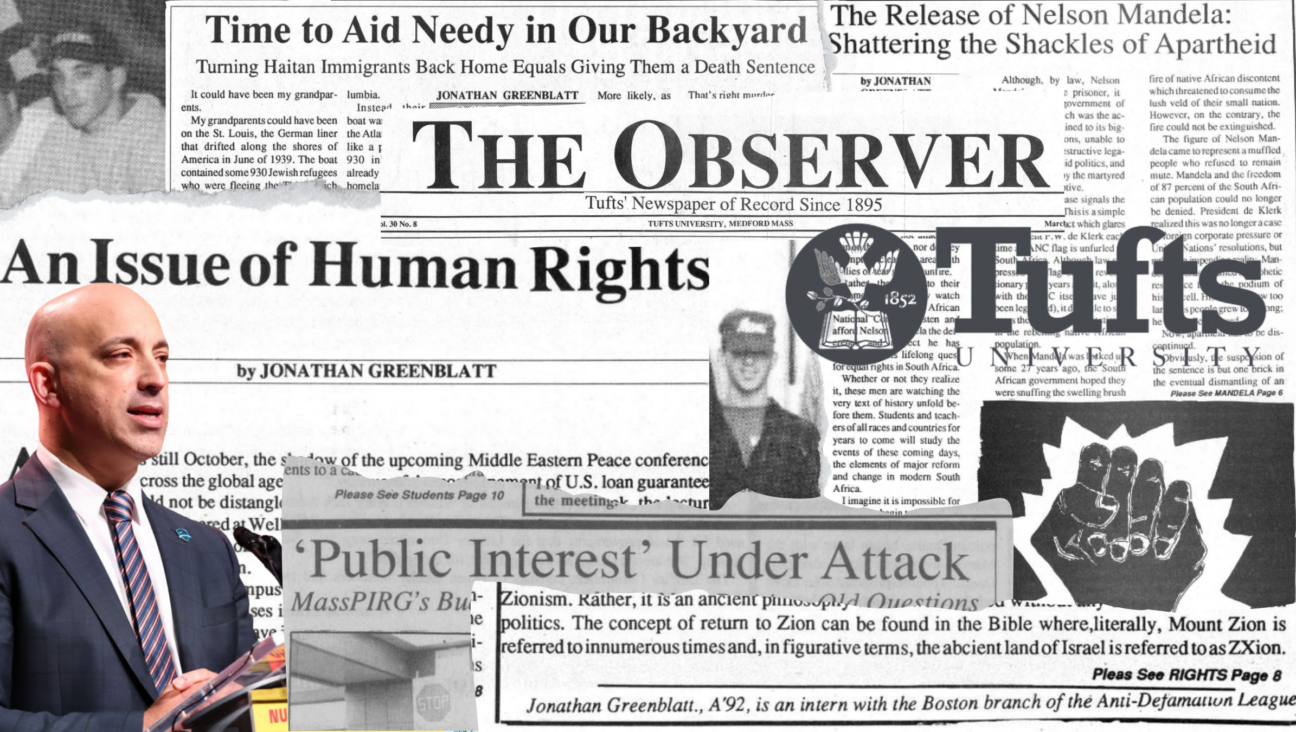Dennis Ross Moves From Jewish World Back to State Dept. to Face Iran Challenge
Washington — As the new administration’s foreign policy team takes shape, veteran peace negotiator Dennis Ross is emerging as the diplomat who will take on America’s most daunting foreign policy challenge: dealing with a perceived nuclear threat from Iran.
Not so incidentally, the issue is also one that Israel sees as a source of existential threat.
From one perspective, Ross is hardly a surprise pick. Decades-long involvement in Arab-Israeli negotiations has provided him with a sober, pragmatic view of prospects of peace for the region.
But to some observers, Ross seemed like anything but a likely candidate to return to government service in the Middle East anytime soon. Though he worked closely with both Arab and Israeli officials during some 22 years in senior positions in the administrations of Ronald Reagan, George H.W. Bush and Bill Clinton, his career since then has linked him tightly and unambiguously to the Jewish community and Israel.
This is bound to send Iran a message, intentionally or not.
Since 2004, Ross, who headed the Clinton administration’s mediation team in the peace talks between Israel and the Palestinians under the Oslo Peace Accords, has served as founding chairman of the Jerusalem-based Jewish People Policy Planning Institute. The institute’s mission is to outline a policy for the future of the Jewish people, taking into consideration demographic trends and internal and external threats.
“Dennis is a committed American, and what drives him is the American interest,” said Avinoam Bar-Yosef, director-general of the JPPPI, “but he never turned his back on his Jewish roots.”
According to Bar-Yosef, Ross has been involved in all aspects of the group’s work, and he frequently attended meetings in Jerusalem and Washington. He is also a senior fellow at the Washington Institute for Near East Policy, an influential think-tank widely perceived as pro-Israel.
Ross will arrive on the Iran-policy scene at a time of dramatic shifts. President-elect Barack Obama has set forth a policy of engaging the Islamic Republic. His pick for secretary of state, Hillary Rodham Clinton, took a different tone during the campaign, threatening to “obliterate” Iran if it strikes Israel. But Clinton has since adopted Obama’s engagement approach.
Ross, who is expected to be the person in charge of this engagement, has stressed in published articles the need for a cautious approach, one that would couple direct talks and strong incentives for cooperation with threats of tougher sanctions toward Iran. This policy is known as “bigger sticks and bigger carrots.” In a December 4, 2008, Newsweek article, Ross wrote, “Sticks will show Iran what it stands to lose by going nuclear; carrots will show its leaders what they would gain by moderating their behavior.” He warned that there would be one of two “terrible” potential outcomes if this strategy is not taken: a nuclear Iran, or military action.
“For Dennis, this is an opportunity to be at the very pinnacle of diplomacy,” said Steve Rosen, who is a former strategic analyst of the American Israel Public Affairs Committee, the Washington pro-Israel lobby. Rosen, who writes a blog tracking Obama’s Middle East appointments, said the Iran crisis is reaching its “do or die” moment, in which there will be a clear determination on whether the American proposal sways Iranian leadership, or Tehran marches on toward achieving nuclear capability.
Ross, who is not taking interview requests pending his official appointment, believes that President Bush’s administration’s attempts to pressure Iran were ineffective because they failed to create an international coalition that includes China and Russia, and because they did not target Iran’s need for imported refined fuel. It is only with more effective sanctions in hand, according to Ross, that direct talks with the Iranians can work.
Ross, who is 60, comes to his new job with a welter of diplomatic experience from 20-plus years of government service. In addition to his stint as America’s chief negotiator in the Israeli-Palestinian peace process, he has served as director of Near East and South Asian Affairs in the National Security Council of the Reagan administration, as deputy head of the Pentagon’s Office of Net Assessment (also under Reagan), and as director of policy planning in the State Department of George H.W. Bush.
In the State Department position, Ross worked closely with then secretary of state James Baker. Ross was part of a group of aides, all Jewish, who were quickly dubbed collectively as “Baker’s Boys.” Under the direction of Baker, named by Ross as one of his key mentors, the aides cajoled, persuaded and ultimately pressured hawkish Israeli leader Yitzhak Shamir into attending the inaugural Madrid peace conference in 1991. Baker and his aides later led a push to link a $10 billion loan guarantee, which Israel sought urgently from the United States, to an agreement by Israel to freeze West Bank settlements.
At the same time, Ross’s mediation of the Israeli-Palestinian peace process under Bill Clinton earned him many friends and admirers on the Israeli side, and fewer on the Arab side. His deputy in the process, Aaron David Miller, has criticized his approach for being too solicitous of Israel. Miller claimed that Ross was, in fact, acting as Israel’s lawyer.
Less known is Ross’s involvement, parallel to his work with the Jewish think tank, on two Ramallah-based projects focused on empowering Palestinian reformists within Fatah. The programs — one for young activists, the other for more established political figures —were part of an attempt to lay the groundwork for the next generation of Palestinian leadership.
Ziad Asali, president and founder of the American Task Force on Palestine, said Ross’s close ties with Israel should not deter the pro-Arab community. “Having failed in the past would give him a personal incentive this time around,” he said.
A native of San Francisco, Ross grew up in a secular, nonreligious household, with a Jewish mother and Catholic stepfather. But his subsequent career path drew him deeply into the affairs of Jews and Israel.
As Ross faces his newest challenge, Israel has made clear its concern that talks with Iran might not produce a positive outcome. The New York Times reported January 11 that Israel requested America’s assistance in launching its own military attack against an Iranian nuclear device but was turned down by Bush after the president consulted with Robert Gates, his defense secretary. Gates will remain in this position in the Obama administration.
Last month, Israel’s president, Shimon Peres, called on the incoming Obama administration to delay talks until after Iran’s June 10 elections, since engagement could be used by President Mahmoud Ahmadinejad as a political asset.
In her Senate confirmation testimony January 13, Clinton sought to assuage Israel’s concerns. Israel, she said, “should know that the Obama administration will be consulting broadly and deeply so that when we move, we will move in concert insofar as possible.”
Though Washington insiders are confident that Ross will be appointed to the Iran portfolio, the Obama transition team has not yet officially named him, or any of the several other expected nominations in the State Department and in Obama’s National Security Council. Possible nominees as special envoy in charge of the Arab-Israeli conflict include two former ambassadors to Israel, Daniel Kurtzer and Martin Indyk. Both were former Ross colleagues under Bill Clinton. Some reports, however, suggested that Hillary Rodham Clinton would be interested in getting a “fresh face” to lead the peace-brokering effort.
Obama is also expected to appoint Puneet Talwar as the council’s senior director on the Middle East. Talwar, who served as the Middle East expert on the Senate Foreign Relations Committee, is known as a strong advocate of engaging Iran and is expected to have his voice heard on this issue.
Also making their voice heard are outside advisers, on the need for broader engagement with Iran. In a joint policy paper with foreign policy recommendations for the incoming president published December 2, 2008, and written by Middle East scholars Suzanne Maloney of the Brookings Institution and Ray Takeyh of the Council on Foreign Relations, the Obama administration was urged not “to be tempted to take the easy way out by offering merely new rhetoric,” but to “embark on far deeper reevaluation of its strategy.”

I hope you appreciated this article. Before you go, I’d like to ask you to please support the Forward’s award-winning journalism this Passover.
In this age of misinformation, our work is needed like never before. We report on the news that matters most to American Jews, driven by truth, not ideology.
At a time when newsrooms are closing or cutting back, the Forward has removed its paywall. That means for the first time in our 126-year history, Forward journalism is free to everyone, everywhere. With an ongoing war, rising antisemitism, and a flood of disinformation that may affect the upcoming election, we believe that free and open access to Jewish journalism is imperative.
Readers like you make it all possible. Right now, we’re in the middle of our Passover Pledge Drive and we still need 300 people to step up and make a gift to sustain our trustworthy, independent journalism.
Make a gift of any size and become a Forward member today. You’ll support our mission to tell the American Jewish story fully and fairly.
— Rachel Fishman Feddersen, Publisher and CEO
Join our mission to tell the Jewish story fully and fairly.
Only 300 more gifts needed by April 30























